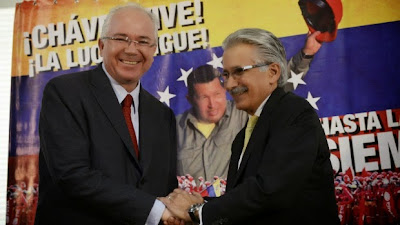Let me explain what I see: both crudes are identical. The Canadian crude is at or close to the surface. These conditions lead to degassing (the oil lost most of the natural gas). They also lead to much higher viscosity. The setting near the surface allows the crude mixed with sand to be shoveled into large trucks, taken to a plant where the sand and crude are separated. The crude (what many of you call "tar") is sent to an upgrader or diluted with light hydrocarbons to be sent to a refinery which performs the upgrading steps. Sometimes the crude is extracted using wells and injecting steam to lower the oil viscosity so it flows to the surface.
Pdvsa president Rafael Ramirez shakes hands with Chevron Texaco's
Latinoamerica President, a rather arrogant Iranian I met in Caracas
several years ago, as they celebrate a recent deal. ChevronTexaco owns
shares in two giant heavy oil joint ventures in Venezuela. This is the oil
that competes with Canadian heavy oil.
In Venezuela the oil is found deeper, and the deposit has a higher geothermal gradient (it sits on top of hot basement rocks). The viscosity is lower, and it has a lot of methane in solution. This allows the foreign companies working in Venezuela and PDVSA to pump the wells using progressive cavity pumps. However, pumping that heavy oil is only feasible in a portion of this giant oil deposit. The majority of the oil requires steam injection, and this is allowed for in the well design (the wells are being drilled to withstand the high temperature environment). That oil also requires upgrading. Today, there are four upgraders located in Venezuela. But they can only upgrade half the crude, so the other half is sent to either China or the USA.
In the USA, this Venezuelan crude competes with Canadian crude. They almost the same. Thus blocking Canadian access to the Gulf of Mexico refineries leads to higher prices for the Venezuelan crude. Actions taken to curtail Canadian production lead to a better market position for the Venezuelan heavy oil.
I looked at this very carefully, and pointed it out in several forums. And I think it should be evident the Venezuelan regime is hostile to the USA. Not only does it overtly act to block US diplomacy, it also takes action to help Iran and Syria, is known to serve as a convenient way station for half the cocaine being shipped to the USA and Europe, and meddles in other countries' internal politics by funneling cash via illegal means to extreme left parties. This means the Venezuelan regime represents a clear and present danger to the USA.
Thus the letters and campaigns which focus solely on Canadian heavy oil and ignore Venezuelan heavy oil are more likely political, and may even be covertly financed or encouraged by Venezuelan agents. Debate that.


No hay comentarios:
Publicar un comentario